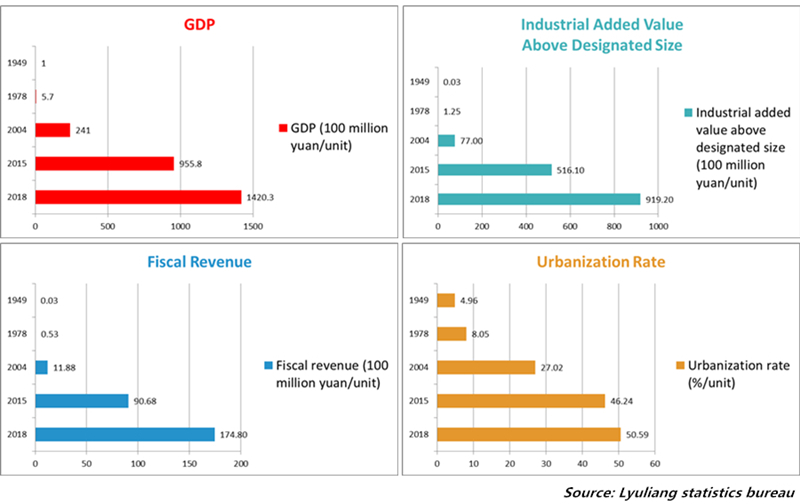Lyuliang makes great progress over past 70 years
Updated: 2019-09-20

A figure for economic statistics of Lyuliang city [Photo/chinadaily.com.cn]
Lyuliang, a city in west-central Shanxi province, has made tremendous progress in economic and social development over the past 70 years.
The city's GDP increased from 100 million yuan ($14.11 million) in 1949 to 142.03 billion yuan in 2018 and the general public budget revenue was 575.2 times higher than in 1971 when the administration of Lyuliang was established. The average income of urban residents was 144.5 times higher than in 1978, while that of rural residents was 145.7 times higher.
The percentage of people who have received at least basic education is now 98.2 percent.
Poverty alleviation has come a long way as well. Through industrial development, relocation, and social security support, the number of people living under the poverty line has been reduced to 83,000.
Lyuliang has also been promoting rural revitalization and building demonstration villages. Specialty fairs are organized every spring and autumn, with many farm produce brands such as Lyuliang red dates, Lanxian county potatoes, and Jiaokou county mushrooms receiving national recognition.
Lyuliang has also been working to transform its traditional industries and boost emerging industries, with the added value of its non-coal industries accounting for 52.4 percent of its total GDP in 2018.
The city has been reducing its overcapacity in coal production and optimizing its coal industry, with its advanced coal production capacity increasing to 70 percent of its total coal capacity in 2018. The local coking industry now features new techniques and processes introduced by 19 modern coal chemical demonstration projects in Jiaocheng and Xiaoyi counties in Shanxi province. The integrated development of the coal, electricity, and aluminum industries has accelerated due to a 500,000-ton light alloy aluminum project, which is the largest and most advanced of its kind in Shanxi province.
Lyuliang, a major production region for baijiu, or Chinese spirits, is committed to building a world-famous production center for mild aromatic Chinese spirits and has held the World Wine Culture Expo for years. The baijiu industry provides strong support for the local economy.
The city has also boosted its tourism brands, and the city ranks among the best in Shanxi province in terms of number of tourists and tourism revenue growth.
Lyuliang aims to develop into a big data industrial hub. It has made significant progress in the construction of big data facilities, attracting talents and professionals, applying, promoting, and integrating big data, and industrial upgrading.
Big data centers such as the Lyuliang Tianhe-2 Cloud Computing Center and the Huawei Shanxi (Lyuliang) Big Data Center have already begun operating.
The city has established a big data expert advisory committee composed of 31 experts to offer support for the local big data industry. Big data industrial development promotions are held annually as well.
To support the growth and transformation of these industries, the city has been developing ways to attract talent and professions. It has hired more than 100 academics, introduced 206 high-level scientific and technological professionals, and built six academic workstations.
Lyuliang has coordinated its reform and opening up with industrial transformation and upgrading.
The city has accelerated reforms in eight local provincial-level development zones, strengthening the role of the development zone as an engine of economic transformation. The reform of state-owned enterprises has been sped up, with 87 enterprises doing corporate restructuring and 15 carrying out mixed ownership system reforms. This has stimulated the vitality and competitiveness of state-owned enterprises. Reforms on the rural collective property rights system are currently underway in local villages, helping facilitate economic growth in rural Lyuliang.
The city has deepened cooperation with the Bohai Rim region, the Yangtze River Delta region, and the Pearl River Delta region by attracting investment and professionals from Beijing, Shanghai, Guangzhou, and Shenzhen through years of promotion. It has also arranged for companies to attend the 1st China International Import Expo with the city's total transaction value ranking first in Shanxi province. Eleven additional counties and districts in the city now engage in international trade.
The environment has always been a major concern for the city. It has been carrying out eight major projects related to environmental protection, and its forest coverage rate now sits at 32.8 percent.

